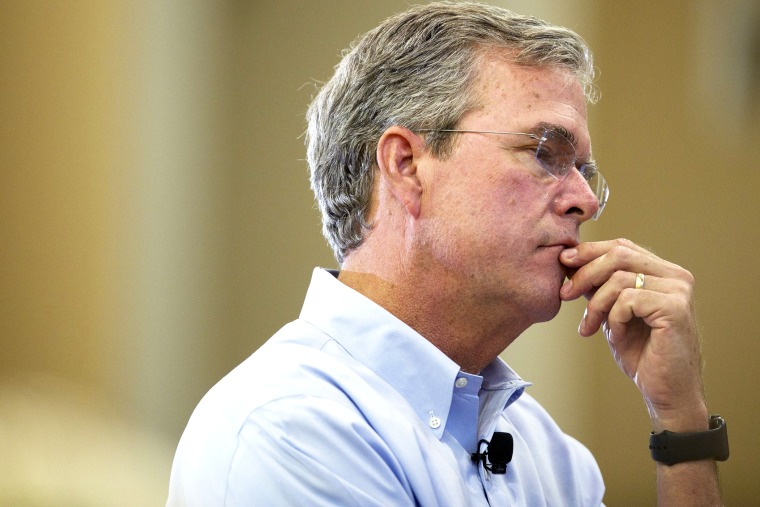When Jeb Bush's national campaign was in its earliest stages, the former governor and his team were well aware of the challenges associated with running as the brother of a failed, recent president. The task at hand was simple: come up with a way to carry the burden effectively.
Earlier this year, the preferred solution was a clumsy form of denial. Asked in February about some of former President George W. Bush's catastrophic decisions, Jeb Bush declared, "I won't talk about the past." Two months later, the Florida Republican was asked whether his brother made any mistakes at all in the area of foreign policy. "I'm not going to get into that," he replied.
It seemed like an unsustainable posture, and it was. Team Jeb needed a less-evasive, more-substantive strategy, which apparently meant throwing the "I am my own man" mantra out the window.
Last week, for example, the former governor tried -- and failed -- to blame the Iraq disaster on the Obama administration, as if his brother wasn't responsible for one of the most costly foreign-policy calamities in American history. Since then, as MSNBC's Benjy Sarlin helped document, Jeb's only made matters worse.
Former Florida Gov. Jeb Bush said that his brother's successful overthrow of Iraqi dictator Saddam Hussein "turned out to be a pretty good deal" on Thursday while speaking at the APPS National Security Forum in Davenport, Iowa.
Paul Waldman responded in a Washington Post piece, "The idea that removing Hussein 'turned out to be a pretty good deal' is so deranged that it boggles the mind. Imagine if his brother had said to the country in 2003, 'Let me offer you this deal: We'll take out Saddam, and it'll only cost us 4,000 American lives, tens of thousands more Americans gravely wounded in body and spirit, around $2 trillion, a worldwide surge in anti-Americanism, and years of chaos in the Middle East. Whaddya say? Sounds like a pretty good deal, right?'"
For the record, note that for Bush, the international nuclear agreement is a bad deal, but the catastrophic war in Iraq was a "pretty good deal."
Since then, Jeb has bragged about the advice he receives on international affairs from Paul Wolfowitz, and the candidate even went so far as to boast that the "mission was accomplished" when it came to Iraq's security in late 2008.
It's a rather extraordinary evolution. Six months after practically declaring 2001 to 2008 off-limits, Jeb is now practically bragging that he, backed by his Bush/Cheney team of foreign-policy advisers, intends to create a third term for George W. Bush's foreign policy.
The politics of this is bizarre, but it's not the only relevant angle.
As a matter of substance, whoever is responsible for telling Jeb what to think about these issues isn't doing him any favors. His take on Iraq isn't just filled with dubious assessments; it's littered with important factual errors -- to the point that Jeb seems confused about basic details. Bush's dubious claims have been contradicted by U.S. military leaders themselves.
Several months ago, during a Jeb speech on foreign policy, the Washington Post's Chris Cillizza lauded, "What Bush is proving" is that he "doesn't need much coaching on foreign policy. He knows this stuff cold." No one in American politics, regardless of party or ideology, is saying anything like this anymore. All of the assumptions -- about Jeb's competence, about him being the "smart Bush," about his reputation as a serious policy wonk -- have collapsed.
And politically, these developments come at a severe cost. In effect, Team Jeb is gambling that there's a real appetite in this country for four more years of George W. Bush's approach to foreign policy. Why else would Jeb be talking, out loud and on purpose, about "mission accomplished"? And Paul Wolfowitz's guidance? And his choice of his brother as his top adviser on U.S. policy in the Middle East?
If there's a deep well of support for a Bush/Cheney approach to the world, maybe this forehead-smacking strategy will pay some partisan dividends for Jeb in the GOP nomination process. But as things currently stand, "I won't talk about the past" is starting to look like genuine wisdom compared to what the 2016 candidate is saying now.
